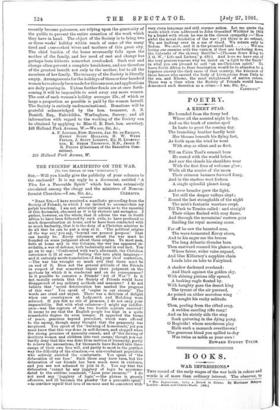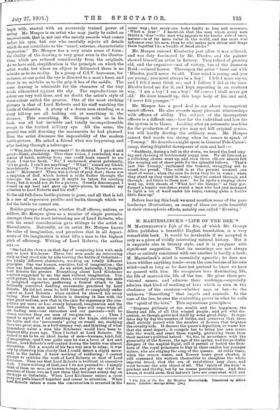BOOKS.
WAR IMPRESSIONS.* Tim record of the early stages of the war both in colour and words is of more than ordinary interest. The observer, to • War Impressions: being a Record in Colour. By Mortimer BidgPe'l London • Aden, and Charles Black. [20aa begin with, started with an accurately trained power of seeing. Mr. Menpes is an artist who may justly be called an impressionist, that is, not one who merely records what comes before his eyes, but One who carefully rejects all details which do not contribute to the "exact, extreme, characteristic impression." Mr. Menpes has a very acute sense of form ; the vitality of the drawing is very great even in the illustra- tions, which are reduced considerably from the originals. As we have said, simplification is the principle on which the artist works, but where an object is delineated there is no mistake as to its reality. In a group of O.I.V. horsemen, for instance, at one point the eye is directed to a man's knee, and there is no mistake as to the grip it has of the saddle. The same drawing is admirable for the character of the tiny beads silhouetted against the sky. The reproductions in colour are very well done, and no doubt the artist's style of water-colour suited the process. One of the most striking pictures is that of Lord Roberts and his staff watching the battle of Osfontein. A group of a dozen men standing on a stony hill-top are all looking out at something in the distance. This something, Mr. Menpes tells us in his book, was all but invisible and totally incomprehensible except to the trained military eye. All the same, the general was still directing the movements he had planned. Here the artist discusses the impossibility of the modern battle-picture. He asked a friend what was happening, and after looking through a telescope-
", Why, look, there's a movement !' he shouted. I gazed and gazed—blank, absolutely. This clear vision, I concluded, was a matter of habit, nothing less ; one could train oneself to see Boers. I was too fresh. No,' I exclaimed, almost petulantly, it's no good : I can't see anything.' What ! ' roared any friend, incredulously. You don't see anything ? Why, there's a move- ment!' Movement P There was a cloud of grey dust; there was a suspicion of fluff, which looked a trifle fluffier through the telescope. On an emergency it might be taken for scooting Boers; but it would not do for a picture. Greatly discouraged, I turned on my heel and gave up battle-pieces, to transfer my attention to Lord Roberts and his staff."
So the old full-dress battle-picture is gone, and all that is left is a row of expressive profiles and backs, through which we feel the battle we cannot see.
Besides groups of figures, whether Staff officers, natives, or soldiers, Mr. Menpes gives us a number of single portraits. Amongst these the most interesting are of Lord Roberts, who with his usual consideration gave sittings to the artist at Bloemfontein. Naturally, as an artist Mr. Menpes knows the value of imagination, and perceives that in all depart- ments of life imagination is what lifts a man to the highest pitch of efficiency, Writing of Lord Roberts, the author says :—
"One had the chance on that day of comparing him with such men as Lord Kitchener. These two men made an interesting study as they stood side by side viewing the battle of Osfontein- two totally different characters, wol king on totally different principles. One was human, sensitive, full of imagination ; the other was hard, inscrutable. As an artist, naturally, I thought Lord Roberts the greater. Everything about Lord Kitchener somehow suggested to me the man without imagination. You could picture him as he stood there, viciously chewing the ends of unlighted cigarettes, preferring a frontal attack to the brilliantly conceived flanking movements practised by Lord Roberts. He did not seem to hold himself so completely under control as Lord Roberts : when excited he showed his every feeling. Now that Great Britain is drawing in line with the other great nations, now that in the race for supremacy the com- petitors are more or less evenly balanced, imagination and the liner qualities in man must tell. The time will come when all our leading men—our statesmen and our generals—will be chosen because they are men of imagination Thus I mused to myself as I sat sketching on the kopje, oblivious of the battle and the movements' going on round me, studying these two great men, in a half-dreamy way, and thinking of what tremendous value a man like Kitchener would have been to England fifty years ago. Then I looked at Lord Roberts. He seemed to me to be an ideal leader of men—humane, kind, full of imagination—and I was quite sure he was a lover of Art and Nature. Lord Roberts's self-control during the battle was almost astounding. Not a muscle of his face was seen to relax; it was only by observing him closely that I could detect a slight move- ment in the hands. I know nothing of soldiering : I cannot attempt to criticise the work of Lord Roberts or that of Lord Kitchener. They sav that Lord Roberts is brilliant at executive work. I know nothing of that, and I do not pretend to : I simply think of them as men, as human beings, and give my vivid im- pressions of these two as I saw them that brilliant sunny day on the kopje at Osfontein. When Lord Kitchener enters a room every one pulls himself together and comes to attention. When Lord Roberta enters a room the conversation is arrested in the same way ; but every one looks fondly at him and murmurs,.
What a dear !' I maintain that the man whom every man thinks a dear'—the man who appeals to the tender aide of one's nature—is of far more value in the world, and has more real influence over his men, than he who makes men shiver and drags them together like a bundle of dried sticks."
Mr. Menpes entered Kimberley just after it was relieved, and was duly fascinated by Mr. Rhodes, and the painter showed himself an artist in flattery. They talked of growing
old, and the organiser—not of victory, but of the Jameson Raid—evinced horror. Thereupon the artist " burst out with Rhodes, you'll never be old. Your mind is young, and you are young; you must always be a boy !' I felt I must say so, and I felt I must think so ; and I believe I did at the time.
Rhodes loved me for it, and kept repeating in an exultant way, ' I am a boy ! I am a boy ! Of course I shall never get
old.' He drew himself up, this huge body of his, and said, I never felt younger.' "
Mr. Menpes has a good deal to say about incompetent smart officers. He also records many pleasant relationships with officers of ability. The subject of the incompetent officers is a difficult one,—how far the individual and how far the system is to blame. Looking after an automatic machine for the production of new pins may not kill original genius, but will hardly develop the ordinary man. Mr. Menpes cannot find words too strong when he comes to speak of "Tommy." He describes a night spent in General Pole-Oarew't camp, during frightful downpours of rain and hail :— " Suddenly, during a lull in the storm, we heard the loud sing ing and cheering of boisterously happy men. We all listened as a rollicking chorus went up, and even these officers almost felt like weeping out of sheer pride for the splendid fellows. That's just like Tommy,' exclaimed the General, struggling not to sound too proud. The veldt is at the present moment one sheet of water ; when the men lie down they lie in water ; when they stand up they stand in water ; they're soaked through and through : yet listen to them now.' As he spoke a ringing cheer went up, with shouts of What ho ! she bumps !' as they per- formed a frantic war-dance round a man who had just managed to light a bit of wood under his tunic, causing quite a festive little flare-up."
Before leaving this book we must mention some of the pure landscape illustrations, as many of these are quite beautiful in their atmospheric effects, notably one.called "Evening."



































 Previous page
Previous page